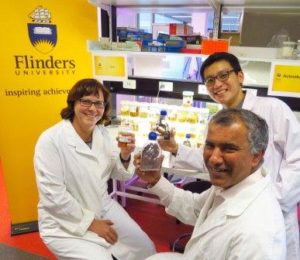
Moves are afoot to create a “blue economy” between South Australia and China’s Shandong Province, with a delegation from Flinders University now on a group mission to strengthen ties between the two Sister States.
Led by Flinders Deputy Vice-Chancellor (Research) Professor David Day and Professor Wei Zhang, Director of the Flinders Centre for Marine Bioproducts Development, the 17-member strong delegation – including experts in the fields of ecology, the environment, biology, chemistry and clean technology – will meet with key research and commercial organisations in Qingdao and Yantai this week in an effort to create partnerships in marine biotechnology.
The contingent was greeted by the Mayor of Qingdao City on February 23 as part of a public symposium, with a program of back-to-back scientific forums to follow with the institutes of the Chinese Academy of Sciences; the Qingdao Oceanology Institute and the Yantai Institute of Coastal Zone Research, and also meetings with industry such as the Gather Great Ocean Group – China’s largest private seaweed processor.
Flinders Centre for Marine Bioproducts Development Manager Mr Raymond Tham said the overall aim of the mission is to establish a blue economy research and industry platform by building new partnerships and strengthening existing ties between the two regions.
“The aim of the blue economy platform is to bring marine researchers, marine biotechnologists, producers and businesses from Shandong Province and South Australia together to establish aligned, multi-disciplinary and integrated networks,” Mr Tham said.
“This is consistent with the Chinese Central Government’s initiative for a ‘Blue Economy National Strategic Area of Development’, of which Shandong and Qingdao are focal points.
“The visit will not only enhance bilateral ties but will allow us to look at ways we can continue collaborating in the future across a wider scope of marine biotechnology, such as the incorporation of clean technologies and innovation in cancer research.”
Mr Tham said the mission will also strengthen Flinders existing partnership with the Gather Great Ocean Group (GGOG).
Flinders and GGOG have set up a joint research laboratory that focuses on developing sustainable technologies to convert beach-cast seaweed in South Australia into a range of high-value products, including functional foods, medical compounds and eco-friendly agricultural chemicals.
“The GGOG recently purchased a South Australian seaweed manufacturing company, and need technologies developed by Flinders University to sustainably utilise the state’s rich abundance of macroalgae resources to support advanced manufacturing in regional South Australia,” he said.
“GGOG has committed $20 million to grow the industry in South Australia and export high value products.”
As part of the mission, a formal agreement for cooperation will also be signed with the Key Laboratory for Coastal Biology and Bioresource Utilisation, based in the Yantai Institute for Coastal Zone Research at the Chinese Academy of Sciences.
The mission has been funded through the Federal Government’s Australia-China Science and Research Fund and supported by the South Australian Government, with researchers from the South Australian Research and Development Institute also part of the delegation.

